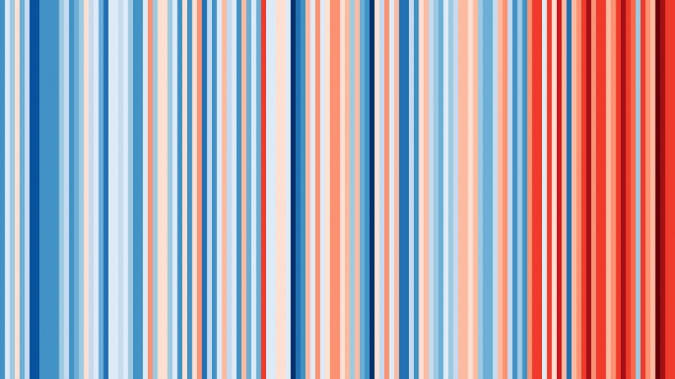Invitation: Climate change - from knowledge to action

The graph visualizes the average temperature for Germany between 1881 and 2017; each strip stands for one year, based on the data set of the DWD. © Ed Hawkins/klimafakten.de
Climate change and its causes are undisputed. But how do we get from knowledge to action? What can science contribute to this? On Thursday, 5.12.2019 at 17:00 Clara Mayer (Fridays for Future), Volker Quaschning (HTW Berlin and Scientists for Future), Bernd Rech (scientific director of the HZB) and Kira Vinke (Potsdam Institute for Climate Impact Research) will discuss these questions. The event takes place in the Bunsen lecture hall of WISTA in Adlershof and is open to the public. Admission is free.
Countless scientific studies show how important it is to limit global warming. We must reduce greenhouse gas emissions at all levels of society and in all sectors in order to achieve our climate targets. But there are many hurdles to implementation. What can science do to speed up action here? Should science interfere at all?
These questions are discussed in an open debate. Participants are Clara Mayer from Fridays for Future, Prof. Volker Quaschning (HTW Berlin and Scientists for Future), Prof. Bernd Rech (Scientific Director of the HZB) and Dr. Kira Vinke of the Potsdam Institute for Climate Impact Research. The debate will be moderated by Rutger Schlatmann (Head of PVcomB at HZB).
The debate is open to the public and will take place in the Bunsen lecture hall of WISTA. Admission is free.
As the discussion takes place within the international user meeting at the HZB, the discussion language is English.
Venue: Bunsen Lecture Hall WISTA, Rudower Chaussee 17, 12489 Berlin
Time: Thursday, 5.12.2019 from 17:00 until 18:30
arö
https://www.helmholtz-berlin.de/pubbin/news_seite?nid=20908;sprache=en
- Copy link
-
Sodium-ion batteries: New storage mechanism for cathode materials
Li-ion and Na-ion batteries operate through a process called intercalation, where ions are stored and exchanged between two chemically different electrodes. In contrast, co-intercalation, a process in which both ions and solvent molecules are stored simultaneously, has traditionally been considered undesirable due to its tendency to cause rapid battery failure. Against this traditional view, an international research team led by Philipp Adelhelm has now demonstrated that co-intercalation can be a reversible and fast process for cathode materials in Na-ion batteries. The approach of jointly storing ions and solvents in cathode materials provides a new handle for the designing batteries with high efficiency and fast charging capabilities. The results are published in Nature Materials.
-
New Helmholtz Young Investigator Group at HZB on perovskite solar cells
Silvia Mariotti starts building up the new Helmholtz Young Investigator Group ‘Perovskite-based multi-junction solar cells’. The perovskite expert, who was previously based at Okinawa University in Japan, aims to advance the development of multi-junction solar cells made from different perovskite layers.
-
Hydrogen storage in MXene: It all depends on diffusion processes
Two-dimensional (2D) materials such as MXene are of great interest for hydrogen storage. An expert from HZB has investigated the diffusion of hydrogen in MXene using density functional theory. This modelling provides valuable insights into the key diffusion mechanisms and hydrogen's interaction with Ti₃C₂ MXene, offering a solid foundation for further experimental research.
